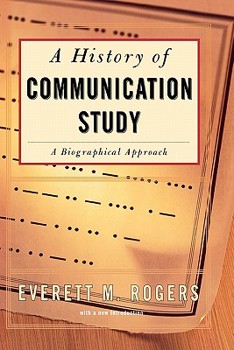History of Communication Study
Select Format
Select Condition 
Book Overview
From Simon & Schuster, History of Communication Study is Everett M. Rogers' in-depth and fascinating biographical approach. Everett Rogers' History of Communication Study offers an in-depth treatise on the history of human communication with archival interviews and research of those who have studied it as an intrical part of the social sciences.
Format:Paperback
Language:English
ISBN:0684840014
ISBN13:9780684840017
Release Date:July 1997
Publisher:Free Press
Length:592 Pages
Weight:1.70 lbs.
Dimensions:1.5" x 8.9" x 6.0"
Related Subjects
Business Business & Investing Communication Communication & Journalism Communications Humanities Language Arts Linguistics Modern (16th-21st Centuries) Politics & Government Politics & Social Sciences Psychology Social Psychology & Interactions Social Science Social Sciences Sociology Words, Language & GrammarCustomer Reviews
1 rating
Academic Hero Worship
Published by Thriftbooks.com User , 18 years ago
The late Everett Rogers was a highly respected communications theorist, and he could very well have put himself in this compendium. For college students in communications who are interested in the theoretical development of the field, this book is useful for obtaining knowledge not just on theories and research methods, but also on the scientists themselves. Things get off to a rather surprising start with coverage of Charles Darwin, Sigmund Freud, and Karl Marx. These guys didn't just do biology, psychology, and politics (respectively), but indirectly influenced communications studies in important ways. The book also covers the breakthroughs by communication scholars such as Wilbur Schramm and Paul Lazarsfeld. However, there are some real weaknesses arising from Rogers' construction of the biographies, which have a real impact on readability and intellectual usefulness. Basing each chapter on the works of a single theorist (or school in one case) left Rogers with the awkward problem of how to cover other theorists and theories that don't quite fit into his methodology, making the chapters generally very long and inconsistent. For example, a short section on the great media theorist Walter Lippman is forced into the middle of the chapter dedicated to the arguably less influential Harold Lasswell. Meanwhile, some sections lead to suspicions of academic favors and favoritism. The Freud chapter contains a lengthy discussion on a group of researchers called the Palo Alto Group, whom Rogers describes in great detail before concluding that they were only tangentially connected to Freud's theories and had no real influence in the long run. So why are they in the book? And the exasperated reader will often cry "WRAP IT UP!" at Rogers' severe lack of brevity, with the grand prize going to the interminable and meandering 66-page chapter on the Chicago School; while all chapters generally go off on tangents and exercises in intellectual minutiae. Overall, it's good to know about all these influential theorists if you have an interest in the field, but it's not so useful slogging through dozens and dozens of pages on the (usually) unexceptional personal lives of academics and how much they were/are worshipped by other academics. This book is still very important for those in the field, but prepare for an inconsistent and very verbose read. [~doomsdayer520~]






